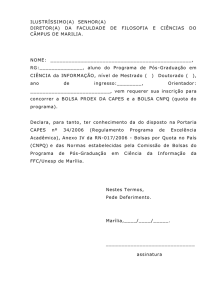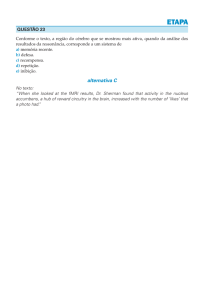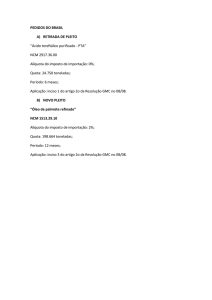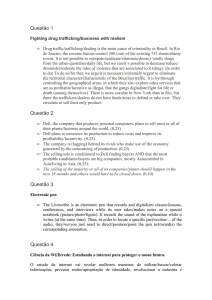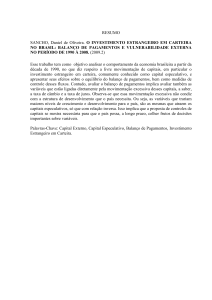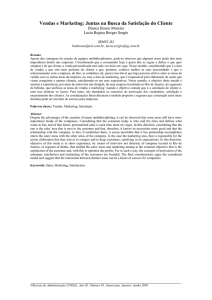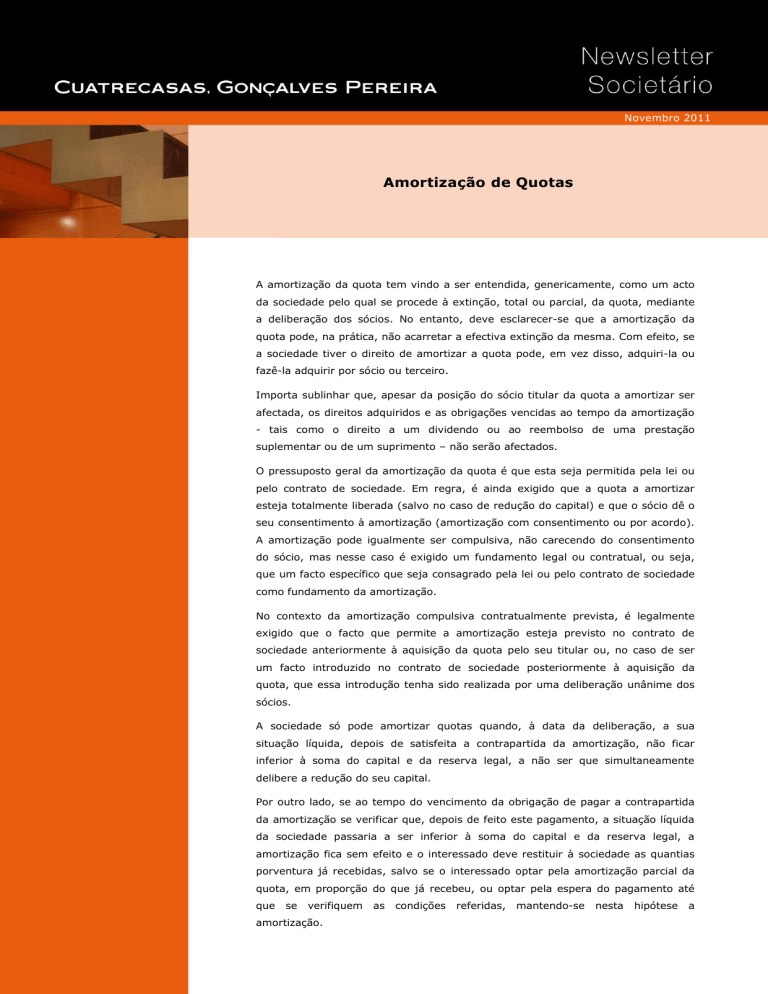
Novembro 2011
Amortização de Quotas
A amortização da quota tem vindo a ser entendida, genericamente, como um acto
da sociedade pelo qual se procede à extinção, total ou parcial, da quota, mediante
a deliberação dos sócios. No entanto, deve esclarecer-se que a amortização da
quota pode, na prática, não acarretar a efectiva extinção da mesma. Com efeito, se
a sociedade tiver o direito de amortizar a quota pode, em vez disso, adquiri-la ou
fazê-la adquirir por sócio ou terceiro.
Importa sublinhar que, apesar da posição do sócio titular da quota a amortizar ser
afectada, os direitos adquiridos e as obrigações vencidas ao tempo da amortização
- tais como o direito a um dividendo ou ao reembolso de uma prestação
suplementar ou de um suprimento – não serão afectados.
O pressuposto geral da amortização da quota é que esta seja permitida pela lei ou
pelo contrato de sociedade. Em regra, é ainda exigido que a quota a amortizar
esteja totalmente liberada (salvo no caso de redução do capital) e que o sócio dê o
seu consentimento à amortização (amortização com consentimento ou por acordo).
A amortização pode igualmente ser compulsiva, não carecendo do consentimento
do sócio, mas nesse caso é exigido um fundamento legal ou contratual, ou seja,
que um facto específico que seja consagrado pela lei ou pelo contrato de sociedade
como fundamento da amortização.
No contexto da amortização compulsiva contratualmente prevista, é legalmente
exigido que o facto que permite a amortização esteja previsto no contrato de
sociedade anteriormente à aquisição da quota pelo seu titular ou, no caso de ser
um facto introduzido no contrato de sociedade posteriormente à aquisição da
quota, que essa introdução tenha sido realizada por uma deliberação unânime dos
sócios.
A sociedade só pode amortizar quotas quando, à data da deliberação, a sua
situação líquida, depois de satisfeita a contrapartida da amortização, não ficar
inferior à soma do capital e da reserva legal, a não ser que simultaneamente
delibere a redução do seu capital.
Por outro lado, se ao tempo do vencimento da obrigação de pagar a contrapartida
da amortização se verificar que, depois de feito este pagamento, a situação líquida
da sociedade passaria a ser inferior à soma do capital e da reserva legal, a
amortização fica sem efeito e o interessado deve restituir à sociedade as quantias
porventura já recebidas, salvo se o interessado optar pela amortização parcial da
quota, em proporção do que já recebeu, ou optar pela espera do pagamento até
que
se
verifiquem
as
condições
referidas,
mantendo-se
nesta
hipótese
a
amortização.
www.cuatrecasasgoncalvespereira.com
1
Nos casos de contitularidade de quotas em que se verifique, relativamente a um
dos contitulares da quota, facto que constitua fundamento de amortização pela
sociedade, podem os sócios deliberar que a quota seja dividida, em conformidade
com o título donde tenha resultado a contitularidade, não podendo, contudo,
nenhuma das novas quotas ter um valor nominal inferior a €1,00. Dividida a quota,
a amortização recairá sobre a quota do contitular relativamente ao qual o
fundamento da amortização tenha ocorrido; na falta de divisão, não pode ser
amortizada toda a quota.
A amortização de quotas pode ser onerosa ou gratuita, consoante implique ou não
o pagamento de uma contrapartida, a qual pode ser prevista no contrato de
sociedade ou acordada pelas partes.
Tratando-se de uma amortização onerosa e a determinação do montante da
contrapartida e respectivo pagamento não estejam previstos no contrato de
sociedade nem exista acordo das partes, a contrapartida da amortização é o valor
de liquidação da quota, determinado nos termos do artigo 105º, nº 2 do Código das
Sociedades Comerciais, com referência ao momento da deliberação, e o pagamento
é fraccionado em duas prestações, a efectuar dentro de seis meses e um ano,
respectivamente, após a fixação definitiva da contrapartida.
Seja qual for a modalidade de amortização da quota que seja adoptada, pode
realizar-se por simples deliberação dos sócios e torna-se eficaz mediante
comunicação dirigida ao sócio por ela afectado.
Caso a amortização de uma quota não seja acompanhada da correspondente
redução de capital, as
quotas
dos
outros sócios serão proporcionalmente
aumentadas.
O contrato de sociedade pode, porém, estipular que a quota figure no balanço como
quota amortizada e bem assim permitir que, posteriormente e por deliberação dos
sócios, em vez da quota amortizada, sejam criadas uma ou várias quotas,
destinadas a serem alienadas a um ou a alguns sócios ou a terceiros.
BREVES DE LEGISLAÇÃO
Informação empresarial simplificada
Resolução da Assembleia da República n.º 124/2011. D.R. n.º 194,
Série I de 2011-10-10
A Assembleia da República recomenda ao Governo, pelo Despacho n.º 14/2011XIX, de 18 de Julho, que o prazo de entrega da informação empresarial
simplificada/declaração anual de informação contabilística e fiscal relativa ao
período de 2010 seja prorrogado de forma a permitir o adequado cumprimento das
obrigações de todos os contribuintes.
Sector empresarial local
Lei n.º 55/2011. D.R. n.º 219, Série I de 2011-11-15
www.cuatrecasasgoncalvespereira.com
2
A presente lei procede à terceira alteração à Lei n.º 53-F/2006, de 29 de
Dezembro,
que
estabelece
o
regime
jurídico
do
sector
empresarial
local,
estabelecendo regras imperativas de transparência e informação no funcionamento
do sector empresarial local e suspendendo a criação de novas empresas municipais,
intermunicipais e metropolitanas, bem como a aquisição de participações sociais
por estas.
BREVES DE JURISPRUDÊNCIA
Trespasse de estabelecimento comercial
Acórdão do Tribunal da Relação do Porto, de 25 de Outubro de 2011
Relator: Ramos Lopes
Processo: 11887/08.9TBVNG.P1
Através deste acórdão, vem o Tribunal da Relação do Porto pronunciar-se sobre o
trespasse de estabelecimento comercial, em especial sobre a transmissão do direito
de arrendamento, sublinhando que o trespasse constitui a negociação definitiva do
estabelecimento comercial (o trespasse é a venda do estabelecimento), operandose, como seu efeito principal, a transferência do domínio sobre objecto mediato,
peculiar e característico que é o estabelecimento comercial.
O Tribunal da Relação do Porto considerou que o estabelecimento comercial ou
industrial é uma organização concreta de factores produtivos, isto é, um conjunto
de coisas corpóreas e incorpóreas organizadas para o exercício do comércio, como
valor de reposição no mercado, organização, podendo ser entendido como um bem
imaterial.
Não obstante, esclareceu ainda este Tribunal que o estabelecimento não se resume
aos bens corpóreos em que se materializa ou objectiva e que não se confunde com
o local em que o mesmo funciona, já que uma coisa é o estabelecimento e outra
diversa é o prédio onde o mesmo eventualmente esteja instalado.
Assim, sendo o trespasse um negócio cujo objecto é tão só o estabelecimento, não
criando ele, ex novo, qualquer relação jurídica arrendatícia relativa ao imóvel onde
se encontre eventualmente instalado e que tenha por sujeitos o proprietário do
imóvel e o titular do estabelecimento, o direito de arrendamento do local onde
esteja instalado o estabelecimento só se transmite com o trespasse se, aquando da
celebração do contrato de trespasse, já existia contrato de arrendamento.
Ora, atendendo a que no referido caso, os pais de um dos Autores deram de
trespasse a um dos réus (também seu filho), mediante o pagamento de
determinada quantia monetária, o trespasse do estabelecimento comercial que
tinham instalado na cave de um imóvel de que eram proprietários, tendo ficado
acordado que não havia lugar ao pagamento de renda, daqui resulta que não foi
celebrado, para lá do trespasse, qualquer contrato de arrendamento.
Assim, decidiu o Tribunal que, com o trespasse, foi transmitida a propriedade do
estabelecimento, tendo sido paga a respectiva contrapartida da transferência do
direito de propriedade do estabelecimento, mas não foi transmitido qualquer
contrato de arrendamento, que foi proporcionado ao réu através de comodato.
www.cuatrecasasgoncalvespereira.com
3
Contrato de concessão comercial
Acórdão do Supremo Tribunal de Justiça, de 27 de Outubro de 2011
Relator: Tavares de Paiva
Processo: 8559/06.2TBBRG.G1.S1
Neste acórdão foi o Supremo Tribunal de Justiça chamado a pronunciar-se sobre a
possibilidade de aplicação analógica da norma do artigo 4.º do Regime Jurídico do
Contrato de Agência (DL n.º 178/86 de 3 de Julho), relativa à forma da cláusula de
exclusividade, ao contrato de concessão comercial. Deste preceito legal resulta que
depende de acordo escrito das partes a concessão do direito de exclusivo a favor do
agente.
Sobre este assunto, esclareceu o Supremo Tribunal de Justiça que, apesar de ser
metodologicamente correcto perante um contrato atípico, como é o caso do
contrato de concessão comercial, atender às regras dos contratos mais próximos
que tenham a sua disciplina fixada na lei, sendo há muito estabelecido neste
domínio o recurso ao regime da agência, a aplicação analógica do regime do
contrato de agência implica uma ponderação caso a caso se a norma em questão se
ajusta ao concessionário.
Ora, neste caso estava em causa um contrato de concessão comercial, que foi
celebrado por acordo verbal efectuado em Novembro de 2000 e cujo início de
vigência foi diferido para o dia 1 de Janeiro de 2001, obrigando-se a concessionária,
em seu nome e por conta própria, a distribuir e vender os produtos da concedente,
numa determinada área geográfica, onde sempre vendeu produtos de empresas
concorrentes da concedente.
Ora, tendo o Tribunal analisado o conteúdo dos artigos 1.º e 4.º do Regime Jurídico
do Contrato de Agência, prevendo o artigo 1.º do referido regime que este é o
contrato pelo qual uma das partes se obriga a promover por conta da outra a
celebração de contratos, de modo autónomo e estável e mediante retribuição,
podendo ser-lhe atribuída certa zona ou determinado círculo de clientes e,
confrontando-os com o contrato de concessão em causa, concluiu este Tribunal que
a aplicação analógica do regime de agência se afigurava manifestamente
desajustada.
Refere o presente acórdão que, na verdade, a concessionária se obrigou em seu
nome e por conta própria a distribuir e vender produtos da concedente, o que
manifestamente não se ajusta ao contrato de agência, pelo que considerou não se
mostrar adequado aplicar analogicamente o artigo 4.º do citado diploma e, assim,
exigir que o contrato de concessão fosse celebrado por acordo escrito.
Em suma, entendeu o Supremo Tribunal de Justiça não se poder exigir para o
contrato de concessão comercial aqui em causa o regime do agente exclusivo a que
alude o artigo 4.º do Regime Jurídico do Contrato de Agência, pelo que não era
necessário acordo escrito para se prever ou provar que a concessionária garantiu à
concedente a exclusividade da distribuição dos seus produtos na área geográfica
que lhe foi atribuída.
www.cuatrecasasgoncalvespereira.com
4
CONTACTOS
CUATRECASAS, GONÇALVES PEREIRA & ASSOCIADOS, RL
Sociedade de Advogados de Responsabilidade Limitada
LISBOA
Praça Marquês de Pombal, 2 (e 1-8º) • 1250-160 Lisboa • Portugal
Tel. (351) 21 355 3800 • Fax (351) 21 353 2362
[email protected] • www.cuatrecasasgoncalvespereira.com
PORTO
Avenida da Boavista, 3265-7º • 4100-137 Porto • Portugal
Tel. (351) 22 616 6920 • Fax (351) 22 616 6949
[email protected] • www.cuatrecasasgoncalvespereira.com
A presente Newsletter foi elaborada pela Cuatrecasas, Gonçalves Pereira & Associados, RL com fi ns
exclusivamente informativos, não devendo ser entendida como forma de publicidade. A informação
disponibilizada bem como as opiniões aqui expressas são de carácter geral e não substituem, em caso
algum, o aconselhamento jurídico para a resolução de casos concretos, não assumindo a Cuatrecasas,
Gonçalves Pereira & Associados, RL qualquer responsabilidade por danos que possam decorrer da
utilização da referida informação. O acesso ao conteúdo desta newsletters não implica a constituição de
qualquer tipo de vínculo ou relação entre advogado e cliente ou a constituição de qualquer tipo de
relação jurídica. A presente newsletter é gratuita e a sua distribuição é de carácter reservado,
encontrando-se vedada a sua reprodução ou circulação não expressamente autori zadas.
www.cuatrecasasgoncalvespereira.com
5
November 2011
Redemption of Quotas
The redemption of quotas has generally been understood to be a corporate action
whereupon the quota is totally or partially cancelled, by resolution of the
quotaholders. However, it should be clarified that the redemption of the quota,
may, in practice, not entail its effective cancellation. Indeed, where the company is
entitled to redeem the quota, it may acquire it or have a quotaholder or a third
party acquire it instead.
It is noteworthy that, despite the position of the quotaholder who holds the quota
to be redeemed being affected, the accrued rights and the obligations matured at
the time of the quotas are redeemed – such as the right to dividends or to the
reimbursement of supplementary capital contributions or of quotaholders loans –
will not be affected.
The general precondition for the redemption of a quota is that the same be
permitted by the law or by the articles of association. As a rule there is also a
requirement that the quota to be redeemed be fully paid up (except in the cases of
capital decrease) and that the quotaholder consent to the redemption (redemption
by consent or agreement). The redemption may also be compulsory and not require
the consent of the quotaholder, but in that case a legal or contractual basis is
required, that is, a specific fact must be established either in the law or in the
articles of association as the basis for the redemption.
In the case of the compulsory redemption set out in the articles of association, the
law requires that the fact that enables the redemption be provided for in the
articles of association prior to the acquisition of the quota by the relevant holder or,
where such fact was provided for in the articles of association after such
acquisition, that the same be provided for by unanimous resolution of the partners.
The company can only redeem quotas when, at the date of the resolution, its net
position after paying the redemption, does not fall below the capital plus the legal
reserve unless it simultaneously resolves to reduce its capital.
On the other hand, if, when the obligation to pay the redemption matures, it is
found that, after such payment, the net position of the company would fall below
the capital plus the legal reserve, the redemption becomes ineffective and the party
concerned must return to the companies any sums he or she may possibly have
already received, unless such party chooses to partially redeem the quota, in the
proportion of the sum already received, or chooses to defer the payment until the
conditions abovementioned are fulfilled, in which case the redemption will stand.
www.cuatrecasasgoncalvespereira.com
6
In the case of joint ownership of quotas where a fact occurs in respect of one of the
co-owners that constitutes the basis for redemption by the company, the
quotaholders may resolve that the quota be divided, in accordance with the
document establishing the joint ownership; however, none of the new quotas can
have a nominal value of less than EUR 1.00. Once the quota is divided, the
redemption will concern the quota of the co-owner in respect of which the fact
which constituted the basis for redemption occurred; if the quota is not divided the
same cannot be redeemed in its entirety.
The redemption of the quota may be for consideration or free of charge, depending
on whether the same implies the payment of consideration or not, which
consideration may be provided for in the articles of association or agreed upon by
the parties.
In case of a redemption for consideration, where neither the articles of association
nor an agreement between the parties provide for either the determination of its
amount nor for its payment, the consideration for the redemption is the value of
settlement of the quota, determined in accordance with Article 105(2) of the Código
das Sociedades Comerciais (Companies Code), as at the time of the resolution, the
payment being divided into two instalments to be paid within six months to a year,
respectively, once the consideration is finally fixed.
Irrespective of the form of redemption of the quota adopted, the same may be
carried out by simple resolution of the quotaholders and takes effect by means of a
notice to the quotaholder concerned by it.
Unless the redemption of a quota is accompanied by a capital decrease, other
quotaholders’ quotas will be increased proportionally.
The articles of association may, however, establish that the quota appear in the
balance sheet as a redeemed quota and permit that one or several quotas intended
to be sold to one or several quotaholders or third parties be subsequently created
by resolution of the quotaholders in lieu of the redeemed quota.
LEGISLATION HIGHLIGHTS
Simplified corporate information
Parliament Resolution No. 124/2011. D.R. (Portuguese official gazette)
No. 194, Series I of 2011-10-10
By its Despacho No. 14/2011-XIX, of 18 July, the Parliament recommends the
Government to extend the deadline for the delivery of the simplified corporate
information/annual accounting and tax statement for 2010 to enable all taxpayers
to comply with their obligations.
Local business sector (Sector empresarial local)
Law No. 55/2011. D.R. (Portuguese official gazette) No. 219, Series I of
2011-11-15
www.cuatrecasasgoncalvespereira.com
7
This law amends for the third time Law No. 53-F/2006, of 29 December, laying
down the legal framework of the local business sector, establishing imperative
transparency and information rules in the operation of the local business sector and
suspending the establishment of new municipal, inter-municipal and metropolitan
undertakings, as well as the acquisition of holdings by these undertakings.
CASE-LAW HIGHLIGHTS
Assignment of lease of a commercial establishment
Judgment of the Court of Appeal of Porto, of 25 October 2011
Rapporteur: Ramos Lopes
Case: 11887/08.9TBVNG.P1
With this judgment, the Court of Appeal of Porto rules on the assignment of lease of
commercial establishment, in particular on the transfer of the right to the lease,
emphasising that the assignment of lease constitutes the final negotiation of the
commercial
establishment
(the
assignment
of
lease
is
the
sale
of
the
establishment), the main effect of which is the transfer of ownership over the
mediate, peculiar and characteristic object, which is the commercial establishment.
The Court of Appeal of Porto held that the commercial or industrial establishment is
a concrete organisation of productive factors, that is, a number of tangible and
intangible things organised towards the pursuit of a business, such as the
replacement value, and may understood to be an intangible asset.
However, the court also clarified that the establishment does not only consist of the
intangible assets to which it amounts and is not to be confused with the place
where the same operates, as the establishment is different from the premises
where the same may be installed.
Therefore, considering that the assignment of lease is a transaction whose only
object is the establishment and that it does not create, ex novo, any legal lease
relationship in respect of the premises where the establishment may be installed
between the owner of the premises and the owner of the establishment, the right to
the lease of the premises where the establishment is installed is only transferred by
way of the assignment of lease if, at the time of the execution of the purchase of
lease, the lease agreement already existed.
Considering that in this case, the parents of one of the plaintiffs assigned to one of
the defendants (also their child), against the payment of a given amount of money,
the lease of the commercial establishment installed in the basement of a property
owned by them, and that it had been agreed that no rent would be paid, no lease
agreement was entered into in addition to the assignment of lease.
Thus the court ruled that ownership of the establishment was transferred as a
result of the assignment of lease, with the payment of the relevant consideration
for the transfer of the property right of the establishment, but that no lease
agreement was transferred as the latter was given to the defendant under a lending
arrangement.
www.cuatrecasasgoncalvespereira.com
8
Commercial Concession
Judgment of the Supreme Court of Justice, of 27 October of 2011
Rapporteur: Tavares de Paiva
Case: 8559/06.2TBBRG.G1.S1
In this judgment, the Supreme Court of Justice was requested to rule on the
possibility to apply by analogy the provisions of Article 4 of the Regime Jurídico do
Contrato de Agência (DL No.178/86 of 3 July) (legal framework of agency
agreement) relating to the form of the exclusivity clauses, to commercial
concessions. In accordance with this provision, the granting of an exclusive right in
favour of the agent is conditional upon a written agreement between the parties.
Concerning this matter, the Supreme Court of Justice clarified that, despite the fact
that it is methodologically correct in the case of non-standard contracts, such as
concession agreements, to follow the rules of the closest form of contracts
governed by the law and that in this area it has been established long ago to apply
the provisions of agency agreement, applying the framework of the agency
agreement by analogy requires a case-by-case analysis of whether the provision in
question is adequate for the concessionaire.
The case under consideration related to a commercial concession entered into
verbally in November 2000, the effective date of which was deferred to 1 January
2001, whereby the concessionaire undertook, in its name and on its behalf, to
distribute and sell the products of the grantor, in a specific geographical area,
where it had always sold products of firms competing with the grantor.
The court analysed the content of Articles 1 and 4 of the Regime Jurídico do
Contrato de Agência; in accordance to Article 1 this is the contract whereby one of
the parties undertakes to promote, on behalf of the other party, the conclusion of
contracts autonomously, on a stable basis and for a consideration, and may be
assigned a certain zone or a given set of clients; comparing them with the
commercial concession in question, the court concluded that the application by
analogy of the provisions governing agency agreements was clearly unsuitable.
The judgment observes that, in actual fact, the concessionaire undertook to
distribute and sell the grantor’s products in its own name and on its behalf, which is
clearly not adjusted to the agency agreement and therefore it considered that to
apply by analogy Article 4 of the abovementioned legal framework was not suitable
and therefore it could not be demanded that the commercial concession be entered
into in writing.
In short, the Supreme Court of Justice considered that the provisions concerning
the agent’s exclusivity to which Article 4 of Regime Jurídico do Contrato de Agência
refers could not be applied to the commercial concession in question and that,
therefore, no written agreement was necessary to establish or prove that the
concessionaire had guaranteed to the grantor the exclusive distribution of its
products in the geographical area assigned to it.
www.cuatrecasasgoncalvespereira.com
9
CONTACT
CUATRECASAS, GONÇALVES PEREIRA & ASSOCIADOS, RL
Sociedade de Advogados de Responsabilidade Limitada
LISBOA
Praça Marquês de Pombal, 2 (e 1-8º) • 1250-160 Lisboa • Portugal
Tel. (351) 21 355 3800 • Fax (351) 21 353 2362
[email protected] • www.cuatrecasasgoncalvespereira.com
PORTO
Avenida da Boavista, 3265-7º • 4100-137 Porto • Portugal
Tel. (351) 22 616 6920 • Fax (351) 22 616 6949
[email protected] • www.cuatrecasasgoncalvespereira.com
This Newsletter was prepared by Cuatrecasas, Gonçalves Pereira & Associados, RL for information
purposes only and should not be understood as a form of advertising. The information provided and the
opinions herein expressed are of a general nature and should not, under any circumstances, be a
replacement for adequate legal advice for the resolution of specific cases. Therefore Cuatrecasas,
Gonçalves Pereira & Associados, RL is not liable for any possible damages caused by its use. The access
to the information provided in this newsletter does not imply the establishment of a lawyer -client
relation or of any other sort of legal relationship. This Newsletter is complimentary and the copy or
circulation of the same without previous formal authorizati on is prohibited.
www.cuatrecasasgoncalvespereira.com
10

